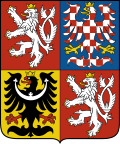
The Czech Republic is a unitary parliamentary republic, in which the President is the head of state and the Prime Minister is the head of government.
Executive power is exercised by the Government of the Czech Republic which reports to the Chamber of Deputies. The Legislature is exercised by the Parliament. Czech Parliament is bicameral, the upper house of the Parliament is the Senate, the lower house of the Parliament is the Chamber of Deputies. The Senate consists of 81 members who are elected for six years. The Chamber of Deputies consists of 200 members who are elected for four years. The Judiciary system is topped by the trio of Constitutional Court, Supreme Court and Supreme Administrative Court.
The highest legal document is the Constitution of the Czech Republic, complemented by constitutional laws and the Charter of Fundamental Rights and Freedoms. The current constitution went in effect on 1 January 1993, after the Dissolution of Czechoslovakia.

The government of Italy is in the form of a democratic republic, and was established by a constitution in 1948. It consists of legislative, executive, and judicial subdivisions, as well as a Head of State, or President.
The Government of Poland takes the form of a unitary parliamentary representative democratic republic, whereby the President is the head of state and the Prime Minister is the head of government. However, its form of government has also been identified as semi-presidential.
A constitutional amendment is a modification of the constitution of a polity, organization or other type of entity. Amendments are often interwoven into the relevant sections of an existing constitution, directly altering the text. Conversely, they can be appended to the constitution as supplemental additions, thus changing the frame of government without altering the existing text of the document.

The president of Romania is the head of state of Romania. Following a modification to the Romanian Constitution in 2003, the president is directly elected by a two-round system and serves for five years. An individual may serve two terms. During their term in office, the president may not be a formal member of a political party.

The Spanish Constitution is the supreme law of the Kingdom of Spain. It was enacted after its approval in a constitutional referendum, and it is the culmination of the Spanish transition to democracy. The Constitution of 1978 is one of about a dozen of other historical Spanish constitutions and constitution-like documents; however, it is one of two fully democratic constitutions. It was sanctioned by King Juan Carlos I on 27 December, and published in the Boletín Oficial del Estado on 29 December, the date on which it became effective. The promulgation of the constitution marked the culmination of the Spanish transition to democracy after the death of general Francisco Franco, on 20 November 1975, who ruled over Spain as a military dictator for nearly 40 years. This led to the country undergoing a series of political, social and historical changes that transformed the Francoist regime into a democratic state.

The president of the Czech Republic, officially the President of the Republic, is the head of state of the Czech Republic and the commander-in-chief of the Armed Forces of the Czech Republic. The president mostly has ceremonial powers as the day-to-day business of the executive government is entrusted to the prime minister, and since many of the president's actions require prime ministerial approval the ultimate responsibility for the president's conduct lies with the government. However, the president is solely responsible for appointing the prime minister, the Cabinet ministers, as well as the members of the Board of the Czech National Bank, and nominating justices to the Constitutional Court, who are subject to Senate approval, among others.

The Constitution of the Czech Republic is the supreme law of the Czech Republic. The current constitution was adopted by the Czech National Council on 16 December 1992. It entered into force on 1 January 1993, replacing the 1960 Constitution of Czechoslovakia and the constitutional act No. 143/1968 Col., when Czechoslovakia gave way to the Slovak Republic and the Czech Republic in a peaceful dissolution.
A supermajority, supra-majority, qualified majority, or special majority is a requirement for a proposal to gain a specified level of support which is greater than the threshold of more than one-half used for a simple majority. Supermajority rules in a democracy can help to prevent a majority from eroding fundamental rights of a minority, but they can also hamper efforts to respond to problems and encourage corrupt compromises in the times action is taken. Changes to constitutions, especially those with entrenched clauses, commonly require supermajority support in a legislature. Parliamentary procedure requires that any action of a deliberative assembly that may alter the rights of a minority have a supermajority requirement, such as a two-thirds vote.
Dissolution of a legislative assembly is the mandatory simultaneous resignation of all of its members, in anticipation that a successive legislative assembly will reconvene later with possibly different members. In a democracy, the new assembly is chosen by a general election. Dissolution is distinct on the one hand from abolition of the assembly, and on the other hand from its adjournment or prorogation, or the ending of a legislative session, any of which begins a period of inactivity after which it is anticipated that the same members will reassemble. For example, the "second session of the fifth parliament" could be followed by the "third session of the fifth parliament" after a prorogation, but the "first session of the sixth parliament" after a dissolution.
An entrenched clause or entrenchment clause of a constitution is a provision that makes certain amendments either more difficult or impossible to pass. Overriding an entrenched clause may require a supermajority, a referendum, or the consent of the minority party. The term eternity clause is used in a similar manner in the constitutions of Brazil, the Czech Republic, Germany, Greece, India, Iran, Italy, Morocco, Norway, and Turkey, but specifically applies to an entrenched clause that can never be overridden. However, if a constitution provides for a mechanism of its own abolishment or replacement, like the German Basic Law does in Article 146, this by necessity provides a "back door" for getting rid of the "eternity clause", too.

The Oireachtas of the Irish Free State was the legislature of the Irish Free State from 1922 until 1937. It was established by the 1922 Constitution of Ireland which was based from the Anglo-Irish Treaty. It was the first independent Irish Parliament officially recognised outside Ireland since the historic Parliament of Ireland which was abolished with the Acts of Union 1800.

The Italian Parliament is the national parliament of the Italian Republic. It is the representative body of Italian citizens and is the successor to the Parliament of the Kingdom of Italy (1861–1943), the transitional National Council (1945–1946) and the Constituent Assembly (1946–1948). It is a bicameral legislature with 600 elected members and a small number of unelected members. The Italian Parliament is composed of the Chamber of Deputies, as well as the Senate of the Republic.

The Constitution of the Italian Republic was enacted by the Constituent Assembly on 22 December 1947, with 453 votes in favour and 62 against. The text, which has since been amended sixteen times, was promulgated in an extraordinary edition of Gazzetta Ufficiale on 27 December 1947. The Constituent Assembly was elected by universal suffrage on 2 June 1946, on the same day as the referendum on the abolition of the monarchy was held, and it was formed by the representatives of all the anti-fascist forces that contributed to the defeat of Nazi and Fascist forces during the Italian Civil War. The election was held in all Italian provinces. The Constitution was drafted in 1946 and came into force on 1 January 1948, one century after the Constitution of the Kingdom of Italy, the Statuto Albertino, had been enacted.

All elections in the Czech Republic are based on the principle of universal suffrage. Any adult citizen who is at least 18 years old can vote, except those who have been stripped of their legal capacities by a court, usually on the basis of mental illness. Elected representatives are elected directly by the citizens without any intermediaries. Election laws are not part of the constitution, but – unlike regular laws – they cannot be changed without the consensus of both houses of the Parliament. The Czech Republic uses a two-round plurality voting system for the presidential and Senate elections and an open party-list proportional representation system for all other elections. The proportional representation system uses the D'Hondt method for allocating seats.

The president of Italy, officially denoted as president of the Italian Republic is the head of state of Italy. In that role, the president represents national unity, and guarantees that Italian politics comply with the Constitution. The president is the commander-in-chief of the Italian Armed Forces and chairs the High Council of the Judiciary. A president's term of office lasts for seven years. The incumbent president is former constitutional judge Sergio Mattarella, who was elected on 31 January 2015, and re-elected on 29 January 2022.

The Chamber of Deputies, officially the Chamber of Deputies of the Parliament of the Czech Republic, is the lower house of the Parliament of the Czech Republic. The chamber has 200 seats and deputies are elected for four-year terms using the party-list proportional representation system with the D'Hondt method. Since 2002, there are 14 constituencies, matching the Czech regions. A Cabinet is answerable to the Chamber of Deputies and the Prime Minister stays in office only as long as they retain the support of a majority of its members. The quorum is set by law to one third (67) of elected deputies. Any changes to the constitutional laws must be approved by at least 60 percent of the Chamber of Deputies. The seat of the Chamber of Deputies is the Thun Palace in Malá Strana, Prague.

The Senate, literally "Senate of the Parliament of the Czech Republic", is the upper house of the Parliament of the Czech Republic. The seat of the Senate is Wallenstein Palace in Prague.

The Constitutional Court of the Czech Republic is a specialized type of court which primarily works to protect the people in the Czech Republic against violations of the Constitution by either the legislature, government or by any other subject that violates people's constitutional rights and freedoms. In this respect, it is similar in functionality to the Supreme Court of the United States, but is distinct from the Supreme Court of the Czech Republic. Of all the various levels of the Czech Judiciary it is the one created with the greatest specificity in the constitution.

A constitutional referendum was held in Italy on 4 December 2016. Voters were asked whether they approved a constitutional law that amends the Italian Constitution to reform the composition and powers of the Parliament of Italy, as well as the division of powers between the State, the regions, and administrative entities.














